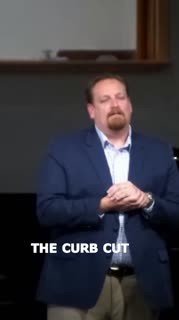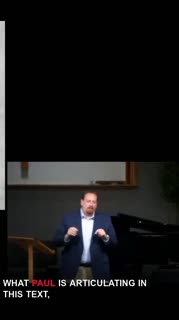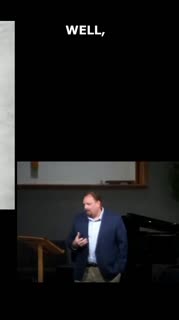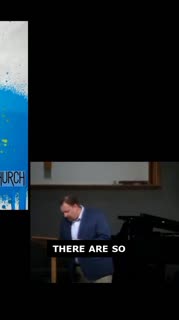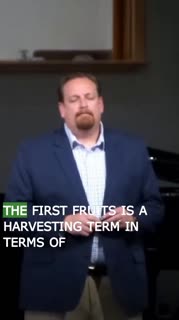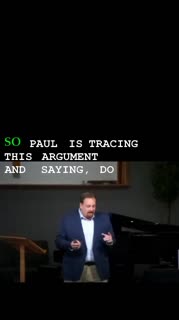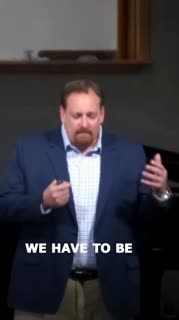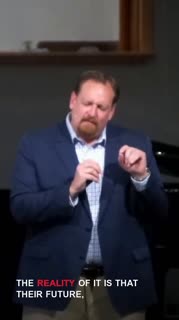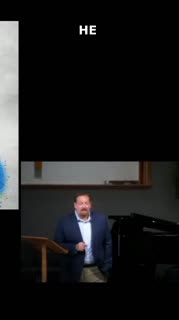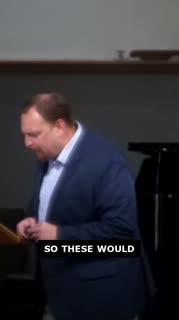Embracing the Reality of Resurrection: Faith and Hope
Devotional
Sermon Summary
Bible Study Guide
Sermon Clips
1. "The curb cut effect is something that sociologists kind of came up with several years back. It's about this. It means when there's positive unintended consequences to something. So if something was made for a small group of people, a certain group of people to help them, but then they find out that it actually helps the larger group. So it gets its name from when they started cutting those ramps into the curbs. Okay, you remember back in the day when none of the curbs had those? It was all a curb, and then you'd stumble off of it or whatever. But then now every curb, you know, there's a ramp. And so they did that for people in wheelchairs and accessibility. But what they found is that it actually, it actually helped moms and dads with strollers and bicycles. And they found it actually helps a large, a much bigger group of people than they even intended in helping." ([00:05:58] (55 seconds)
)
2. "What Paul is articulating in this text, he's saying you don't understand the ramifications of that belief. You don't understand the negative. You don't understand the negative unintended consequences that are going to come from that belief system. And so what he does now is he just unpacks it over and over and over again in this chapter here. And there's many people today that deny any sort of life after death. And so it's very relevant to us today. And so we are in a minority of people in the sense of by groups who believe that there is something to look forward to." ([00:10:05] (34 seconds)
)
3. "Well, it matters more than we know, and this is Paul's point. And so what I'm going to do is, in trying to make this as summarized as possible, I'm breaking down Paul's ramifications into three main categories. So I'm going to talk about how Paul says that if you deny that there's a physical bodily resurrection, there's going to be significant theological ramifications. There's going to be significant theological ramifications. There's going to be significant eschatological ramifications, meaning the last times. And then there's going to be many, many practical ramifications as well." ([00:11:13] (32 seconds)
)
4. "There are so many that goes through. The first is he says that in verse 13, if you look, he says, if there is no resurrection of the dead, then not even Christ is raised. And he brings this point up again in verse 16. He says, for if the dead are not raised, not even Christ is raised. And so Paul's point is, is that if there is no bodily resurrection, if there is nothing that is going to, that we have to look forward to, that there is no such thing as a resurrection, then Christ didn't rise from the dead. And so Christ is still dead and he is and he did not emerge from that tomb and leave that tomb empty." ([00:13:16] (39 seconds)
)
5. "The first fruits is a harvesting term in terms of like that first fruit of the season, which then shows that there's many more fruits that you can expect to come. So you plant your garden, you know, we got the garden out in the back, or you have a garden in your backyard, and that first tomato you see, right, that little tomato or something, you're excited about it. You're not excited necessarily because of that one little tomato, because it's not going to be very helpful to you in that moment, but it's symbolic of what is to come. Right? Okay, yeah, more is coming, and better is coming, and that's good, right?" ([00:14:58] (36 seconds)
)
6. "So Paul is tracing this argument and saying, do you deny that future? Do you deny that future resurrection? Then Jesus isn't resurrected. And if Jesus isn't resurrected, your faith is in vain. We have nothing to believe in. So the hope, when we're trying to tell people about Christ, right, if Christ is dead, and he didn't rise from the dead, we have nothing to offer. So in our faith, what we're believing in is absolutely worthless. And all the things that we're believing in and that we're singing about today, it's absolutely worthless if Christ is dead." ([00:17:33] (33 seconds)
)
7. "We have to be students of the word. This is why we tell you, anyone who comes up here and says, they say, open your Bibles too. Because we want you to be in the word. We want you to be studying the word and seeing the word for yourself. So there's some theological ramifications for denying the future resurrection. But not just theological, there's also eschatological ramifications of denying the future resurrection. Now this is things that are dealing with last times. That's what eschatology means, the study of last times or last things." ([00:21:42] (30 seconds)
)
8. "The reality of it is that their future, the logical conclusion of their belief system puts the people who they loved, who had died in Christ, at great peril. That's not reality, but that's where their belief system takes them to its logical conclusion. That's what Paul is talking about there. There's a second eschatological ramification, and that is we really have nothing to look forward to." ([00:23:06] (30 seconds)
)
9. "And he is ruling over all now. But it seems we live in this world where it does not feel like or appear like that God has triumphed, that Jesus has triumphed over every enemy. But the reality is he has and he will. And that's what we look forward to. That's what our hope is. That's where we don't have to wring our hands and worry in our lives. This is the reason why Christians, of all people, should be the most confident in the most humble sense of the word. Of just understanding what God is doing. Understanding we can trust him." ([00:29:09] (33 seconds)
)
10. "So these would be poor sacrifices. All right, let me conclude here. So what do we do here? Okay, so what's our response? Paul brings this section to a close by giving three commands right at the end. He says this, you know, he says, do not be deceived, verse 33. Bad company ruins good morals. Wake up from your drunkard's stupor is right." ([00:42:55] (23 seconds)
)
Ask a question about this sermon
)
2. "What Paul is articulating in this text, he's saying you don't understand the ramifications of that belief. You don't understand the negative. You don't understand the negative unintended consequences that are going to come from that belief system. And so what he does now is he just unpacks it over and over and over again in this chapter here. And there's many people today that deny any sort of life after death. And so it's very relevant to us today. And so we are in a minority of people in the sense of by groups who believe that there is something to look forward to." ([00:10:05] (34 seconds)
)
3. "Well, it matters more than we know, and this is Paul's point. And so what I'm going to do is, in trying to make this as summarized as possible, I'm breaking down Paul's ramifications into three main categories. So I'm going to talk about how Paul says that if you deny that there's a physical bodily resurrection, there's going to be significant theological ramifications. There's going to be significant theological ramifications. There's going to be significant eschatological ramifications, meaning the last times. And then there's going to be many, many practical ramifications as well." ([00:11:13] (32 seconds)
)
4. "There are so many that goes through. The first is he says that in verse 13, if you look, he says, if there is no resurrection of the dead, then not even Christ is raised. And he brings this point up again in verse 16. He says, for if the dead are not raised, not even Christ is raised. And so Paul's point is, is that if there is no bodily resurrection, if there is nothing that is going to, that we have to look forward to, that there is no such thing as a resurrection, then Christ didn't rise from the dead. And so Christ is still dead and he is and he did not emerge from that tomb and leave that tomb empty." ([00:13:16] (39 seconds)
)
5. "The first fruits is a harvesting term in terms of like that first fruit of the season, which then shows that there's many more fruits that you can expect to come. So you plant your garden, you know, we got the garden out in the back, or you have a garden in your backyard, and that first tomato you see, right, that little tomato or something, you're excited about it. You're not excited necessarily because of that one little tomato, because it's not going to be very helpful to you in that moment, but it's symbolic of what is to come. Right? Okay, yeah, more is coming, and better is coming, and that's good, right?" ([00:14:58] (36 seconds)
)
6. "So Paul is tracing this argument and saying, do you deny that future? Do you deny that future resurrection? Then Jesus isn't resurrected. And if Jesus isn't resurrected, your faith is in vain. We have nothing to believe in. So the hope, when we're trying to tell people about Christ, right, if Christ is dead, and he didn't rise from the dead, we have nothing to offer. So in our faith, what we're believing in is absolutely worthless. And all the things that we're believing in and that we're singing about today, it's absolutely worthless if Christ is dead." ([00:17:33] (33 seconds)
)
7. "We have to be students of the word. This is why we tell you, anyone who comes up here and says, they say, open your Bibles too. Because we want you to be in the word. We want you to be studying the word and seeing the word for yourself. So there's some theological ramifications for denying the future resurrection. But not just theological, there's also eschatological ramifications of denying the future resurrection. Now this is things that are dealing with last times. That's what eschatology means, the study of last times or last things." ([00:21:42] (30 seconds)
)
8. "The reality of it is that their future, the logical conclusion of their belief system puts the people who they loved, who had died in Christ, at great peril. That's not reality, but that's where their belief system takes them to its logical conclusion. That's what Paul is talking about there. There's a second eschatological ramification, and that is we really have nothing to look forward to." ([00:23:06] (30 seconds)
)
9. "And he is ruling over all now. But it seems we live in this world where it does not feel like or appear like that God has triumphed, that Jesus has triumphed over every enemy. But the reality is he has and he will. And that's what we look forward to. That's what our hope is. That's where we don't have to wring our hands and worry in our lives. This is the reason why Christians, of all people, should be the most confident in the most humble sense of the word. Of just understanding what God is doing. Understanding we can trust him." ([00:29:09] (33 seconds)
)
10. "So these would be poor sacrifices. All right, let me conclude here. So what do we do here? Okay, so what's our response? Paul brings this section to a close by giving three commands right at the end. He says this, you know, he says, do not be deceived, verse 33. Bad company ruins good morals. Wake up from your drunkard's stupor is right." ([00:42:55] (23 seconds)
)
